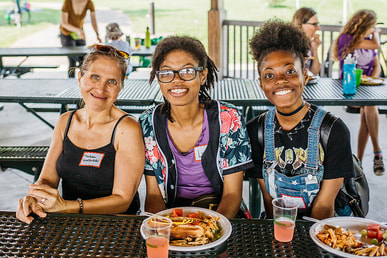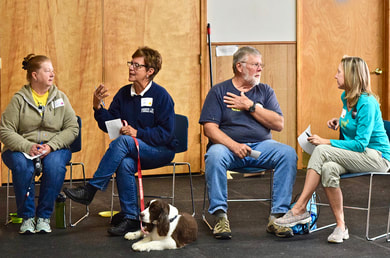An Emotionally Intelligent Nation
Is it too much to ask?
Let's do for our nation what the Yale Center for Emotional Intelligence
is doing for public schools. The faculty and staff at the Yale Center
are helping public schools become "emotionally intelligent" schools,
where students choose words wisely and speak with compassion.
Let's do the same for our nation. Let's understand the role emotions play
in political life today, manage our own, and recognize the difference
between "bullying" emotions and "compassionate" emotions.
Let's then let's follow up with compassion training workshops
in schools, houses of worship, public libraries,
city halls, community centers, and Capital Hill
Is it too much to ask?
A Great Idea, Melania
|
"Mrs. Trump believes that children should be both seen and heard, and it is our responsibility as adults to educate and reinforce to them that when they are using their voices—whether verbally or online—they must choose their words wisely and speak with respect and compassion."
-- White House Website (Melania Trump's Be Best Campaign) |
|
|
I'm with Mrs. Trump. I think that when children are using their voices they should choose their words wisely and carefully, speaking with respect and compassion.
And I'm with the Yale Center for Emotional Intelligence, too. The Center has developed evidence-based projects aimed at helping schools become, in their words, "emotionally intelligent" schools. It's working. |
All of this rings true to process theologians like me. In the spirit of the philosopher Whitehead, we believe that we live in an emotion-laden universe (a universe filled with feeling); that even abstract reasoning has an emotional dimension; and that one of the most profound needs of our time is to help people grow in their capacities for empathy and compassion. Indeed, we believe that even the Soul of the universe, even God, "feels the feelings" of all living beings with "a tender care that nothing be lost." Insofar as we learn to "choose our words wisely and carefully, with respect and compassion," we are actualizing the image of God within ourselves and participating in a great compassion that is more than us.
This gives rise to an important idea. Just as we seek to foster emotionally intelligent schools that are free from bullying, why not foster an emotionally intelligent nation that is free from bullying, too? Let's take the description of such a school from the Yale Center and transpose it to a different level. It would look like this:
This gives rise to an important idea. Just as we seek to foster emotionally intelligent schools that are free from bullying, why not foster an emotionally intelligent nation that is free from bullying, too? Let's take the description of such a school from the Yale Center and transpose it to a different level. It would look like this:
The Emotionally Intelligent School:
|
The Emotionally Intelligent Nation:
|
The RULER Approach to Emotional Intelligence
America's experiment in democracy is failing at many levels and we, its citizens, are part of the failure. One of our failures is our lack of empathy and what the Yale Center for Emotional Intelligence calls "emotional intelligence." True, our politicians know about emotions and seek to manipulate them consciously and unconsciously. Look at the advertisements; go to a rally. But we lack the intelligence to discriminate between healthy emotions and unhealthy emotions in ourselves, and to understand the emotions in others, whether "healthy" or "unhealthy" by our standards. We lack empathy. A healthy democracy requires that citizens “feel the feelings” of others in empathic ways: understanding what it might be like to walk in their shoes. This feeling of feelings can occur by a direct sharing of subjective states in one-on-one situations, but more often occurs by an act of imagination. We imagine what it might be like to experience the world from another person’s point of view and as we do so, we care about their well-being, their happiness. A first step toward such empathy is to develop emotional intelligence of the kind advocated by the Yale Center for Emotional Intelligence with its work in schools. It advocates what it calls the RULER approach:
"RULER is an evidence-based approach for integrating social and emotional learning into schools, developed at the Yale Center for Emotional Intelligence. RULER applies “hard science” to the teaching of what have historically been called “soft skills.” RULER teaches the skills of emotional intelligence — those associated with recognizing, understanding, labeling, expressing, and regulating emotion. Decades of research show that these skills are essential to effective teaching and learning, sound decision making, physical and mental health, and success in school and beyond.
RULER creates schools that are true safe harbors for our children. It does this by developing emotional intelligence in students from preschool to high school and in all adults involved in their education: school administrators, teachers, and support staff. Parents also participate in training so that they can reinforce the emotional skills that students learn at school. Our approach gives a unique depth and consistency to social and emotional learning that empowers school leaders and teachers to create a genuinely safe space for students to learn and grow." (Yale Center for Emotional Intelligence)
"RULER is an evidence-based approach for integrating social and emotional learning into schools, developed at the Yale Center for Emotional Intelligence. RULER applies “hard science” to the teaching of what have historically been called “soft skills.” RULER teaches the skills of emotional intelligence — those associated with recognizing, understanding, labeling, expressing, and regulating emotion. Decades of research show that these skills are essential to effective teaching and learning, sound decision making, physical and mental health, and success in school and beyond.
RULER creates schools that are true safe harbors for our children. It does this by developing emotional intelligence in students from preschool to high school and in all adults involved in their education: school administrators, teachers, and support staff. Parents also participate in training so that they can reinforce the emotional skills that students learn at school. Our approach gives a unique depth and consistency to social and emotional learning that empowers school leaders and teachers to create a genuinely safe space for students to learn and grow." (Yale Center for Emotional Intelligence)
Background: Politics and Emotion
|
|
Guests on Podcast
Dr. Rachel Hewitt, writer and historian. Prof. Karin Wahl-Jorgensen, Director of Research Development and Environment, School of Journalism, Media and Cultural Studies, Cardiff University. Dr. Russell Foster, Leverhulme Early Career Fellow in the Department of European and International Studies, King's College London |

